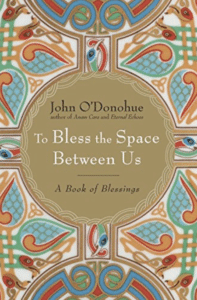Do you have John O’Donohue’s To Bless the Space Between Us? If not, I’d like to send you a copy.❤
My father-in-law sent me that message on March 30. I immediately replied with an enthusiastic yes. I told him the Tweetspeak community would be reading the book in June, and that I’d chosen For One Who Is Exhausted to be our By Heart challenge for May.
The book has still not arrived. Every day I expect it.
Each morning I awake in this new reality and think, Maybe today will be better. And every afternoon, when I call Poetry Time! and the puppies join me outside for a poetry break, I am wholly exhausted.
I am embarrassed by this admission. I am not working on the front lines — in a hospital or a grocery store. But for six weeks I came to this poem in the afternoon with my exhaustion and a large cup of tea and let the poem bless me. I have almost memorized it.
For one who is exhausted, it is a very long poem — thirteen irregular stanzas, no rhyme to hang your memorization hat upon. Yet as I sat with it I began to feel its flow, like waves. The tide goes out with “empty time” and returns with “slow time.” It moves from “hectic” to “Gradually.”
Callie Feyen has a poetry prompt about how a poem’s end words can sometimes become their own poem. To help me learn this one I underlined a word or two in each stanza that stood out to me and used those to remind me what I love in each stanza. Although not end words, they do form a sort of poem:
rhythm
stride
gravity
tide
rest
weather
soul
miracles
rain
twilight
stone
linger
joy
John O’Donohue was an Irish poet, theologian, and philosopher who passed away in 2008. He grew up speaking Gaelic, and if you want to swoon over his accent, listen to one of his last interviews, at On Being. To Bless the Space Between Us, in which this poem appears, is the kind of book that reaches beyond the poetry world, including to people like my father-in-law. Few writers possess that broad an influence.
I am so close to having this one learned, but I still struggle with the stanzas in the middle, beginning with “The tide you never valued has gone out.” I’ve tried picturing the man whose boat is marooned and then destroyed in The Red Turtle, because these lines fit that story perfectly. Still I stumble. Then I find my way again when I reach “You have traveled too fast over false ground,” and then I’ve got it, all the way to the end.
During this quarantine season I’ve spent more time outdoors, rain and shine. We refinished our patio table and chairs, where I sit for poetry time. We walk in the evenings and sit outside in the twilight. Where I live, the ground itself is full of stones, and I’ve been spending this slow time around their calmness, sensing their silence. A friend who ranches cattle said his bovines are at ease. Another friend said his new lambs linger, enjoying the Chihuahua who has come to visit, along with a family member who needed a healthy place to stay. My old puppies feel they have all the time in the world.
This season has been full of small miracles. The coronavirus has given me time to open the well of color around me and to receive my self. There is nothing else to do now but dwell far in this joy.
(I offer this recording of myself reading the poem, which is helping me to connect with the middle section.)
Your Turn
Did you memorize “For One Who Is Exhausted” this month? Or get close? Join our By Heart community and share your audio or video using the hashtags #ByHeart and #MemoriesWithFriends and tagging us @tspoetry. We also welcome photos of your handwritten copy of the poem.
By Heart for June
Once a year I like to learn a poem written for children. For the next By Heart gathering, June 26, we’ll learn “Song of Summer” by Margaret Wise Brown from her collection Nibble, Nibble: Poems for Children.
Song of Summer
Here comes a bunny
The first to stray
Out of April
And into May.
And here comes a robin
The first to fly
Out of June
And into July.
Here are the fireflies
Last to remember
The end of August
And first of September.
And here comes a caterpillar
The last to creep
Out of summer
And into sleep.
—Margaret Wise Brown
Photo by M’s photography, Creative Commons, via Flickr. Post by Megan Willome.
Browse more By Heart
“Megan Willome’s The Joy of Poetry is not a long book, but it took me longer to read than I expected, because I kept stopping to savor poems and passages, to make note of books mentioned, and to compare Willome’s journey into poetry to my own. The book is many things. An unpretentious, funny, and poignant memoir. A defense of poetry, a response to literature that has touched her life, and a manual on how to write poetry. It’s also the story of a daughter who loses her mother to cancer. The author links these things into a narrative much like that of a novel. I loved this book. As soon as I finished, I began reading it again.”
—David Lee Garrison, author of Playing Bach in the D. C. Metro
- Perspective: The Two, The Only: Calvin and Hobbes - December 16, 2022
- Children’s Book Club: A Very Haunted Christmas - December 9, 2022
- By Heart: ‘The night is darkening round me’ by Emily Brontë - December 2, 2022



L.L. Barkat says
I’ve started memorizing again, using my lunch break for the opportunity. So I’m still back at The Tyger, which is where I chose to jump in. And I keep thinking about the words in that poem, “could” and “dare” and “bright” and “what” “what” “what.”
I don’t know if I’ll memorize O’Donohue’s, but that Margaret Wise Brown is looking very tempting. 🙂
It makes me happy to picture you doing poetry time outside with your old puppies.
Megan Willome says
After this one being so challenging, I wanted to follow with an easy one for June. But I am so glad I’ve spent this time steeping in this one. I’ve almost got it! And it’s prepared me to receive the coming blessings in the coming book club.
The repetitions in “The Tyger” are wonderful. I have hand motions to help keep the “what”s straight.
Sandra Heska King says
I love this book and especially this poem. I am embarrassed to say that I am behind in a lot of things–including memorizing. I, too, am exhausted from doing nothing–and yet seem to be busy with many things. What a strange time we are living in.
Megan Willome says
It’s such a different book, isn’t it? I always write poems along with what I’m reading, and this one is drawing out things I would never have thought to write otherwise.
So glad to have this check-in from you, Sandy!
Ramona McKean says
Thank you for sharing this beautiful poem by John O’Donohue, which is truly balm for the soul. Have you heard him read this poem himself? I think you will be moved to hear his wonderful voice here. https://www.youtube.com/watch?v=jj_1ofa9anY&ab_channel=WisdoMango
Megan Willome says
Ramona, oh, yes, indeed I have! I could listen to him read the phone book. It’s such a gift to have these recordings, now that he is gone. It helps his words live even more fully.